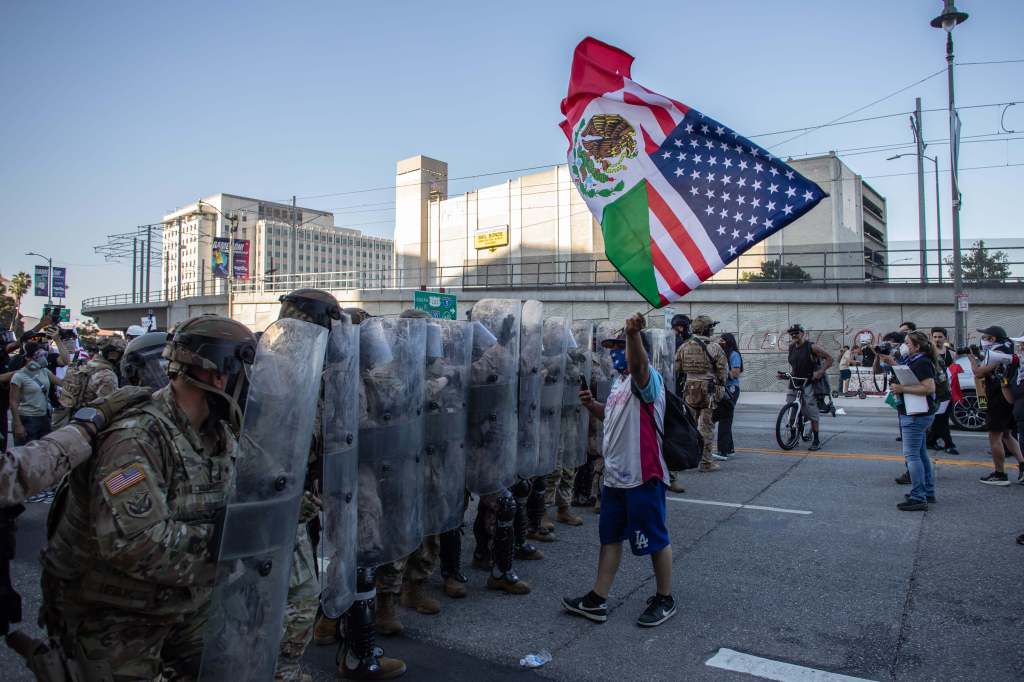
New data show federal immigration arrests dipped across the country in July amid a court order barring arrests without probable cause, but fear remains as heightened immigration enforcements continue across Southern California.
U.S. Immigration and Customs Enforcement made an average of 990 arrests a day between July 1 and July 27, down 19% from the month before, according to data obtained by the Transactional Records Access Clearinghouse, a nonpartisan research center at Syracuse University.
As of July 27, ICE reported 56,945 people held in detention centers across the country, down slightly from 57,861 detainees reported four weeks prior, according to records obtained by TRAC. The true number of detainees is likely larger, TRAC said, as ICE’s list of detention centers was incomplete, omitting facilities like “Alligator Alcatraz” in Florida’s Everglades.
Of those in ICE detention as of July 27, 71.1% have no criminal record, according to TRAC data. Many of those who have committed a crime were convicted of traffic infractions or other minor violations.
As of Aug. 1, data released by ICE show that 3,459 people were being held at the six California immigration detention facilities, including 351 at the Adelanto ICE Processing Center, 416 at Desert View Annex in Adelanto and 1,360 at the Otay Mesa Detention Center in San Diego.
ICE data labels more than 59% of detainees at the Adelanto processing center as criminals, but more than 53% of the detainees have been classified as having no “threat level,” meaning they’ve had no criminal convictions.
The U.S. Department of Homeland Security didn’t respond to a request for comment on enforcement numbers in and around the Los Angeles area.
The drop in arrests came as a federal judge ordered a temporary restraining order July 11 that barred the Trump administration’s roving immigration raids using tactics that the ACLU of Southern California and other civil rights groups argued violated constitutional rights and targeted people because they looked Latino.
While raids became less frequent around Los Angeles after the temporary restraining order, Lupe Carrasco Cardona, an organizer with Union del Barrio, said the group still noted federal immigration activity every day in the city. Immigration enforcement tactics seemed to shift from raids of car washes, Home Depots and other businesses to residential and community enforcements.
After the court order, reports of raids continued in other L.A. County cities, including South El Monte, Downey, Pomona and Baldwin Park, where Union del Barrio organizers previously heard few reports of federal immigration enforcement activity, Carrasco Cardona said.
Around Southern California, Union del Barrio has led community patrols to monitor Home Depots and other hot spots for raids, distribute know your rights materials and warn community members of federal immigration officers’ activity in the area. Carrasco Cardona believes more people would be detained without the work of Union del Barrio and other community organizers and activists across the country.
“Because of community organizing and community self-defense, we are seeing that they are not getting the numbers that they wanted to get,” she said, referring to White House adviser Stephen Miller’s goal of detaining at least 3,000 immigrants each day to achieve President Trump’s mass deportation agenda.
Despite a federal appeals court decision to uphold the temporary restraining order last week, immigration raids have continued. Federal immigration authorities raided a MacArthur Park Home Depot Wednesday, Aug. 6, by arriving in a Penske rental truck to trick immigrants in the area before popping out to arrest them. The Department of Homeland Security said agents detained 16 undocumented immigrants from Guatemala, Honduras, Mexico and El Salvador in the operation that federal authorities dubbed the “Trojan Horse.”
“For those who thought immigration enforcement had stopped in Southern California, think again,” Bill Essayli, acting U.S. Attorney for the Central District of California, wrote on X following the raid. “The enforcement of federal law is not negotiable, and there are no sanctuaries from the reach of the federal government.”
While arrest numbers dipped in July, Carrasco Cardona said Union del Barrio continues to educate communities on changing immigration enforcement tactics and tries to help them feel safe. Witnesses have told the group that immigration officers are more often engaging people in seemingly casual conversations about nearby food spots before asking questions that could lead to their being detained, Carrasco Cardona said.
As the heightened enforcements continue, she said families have expressed concerns over sending their children to school. Others haven’t gone to work and can’t afford rent or groceries.
Originally Published:



